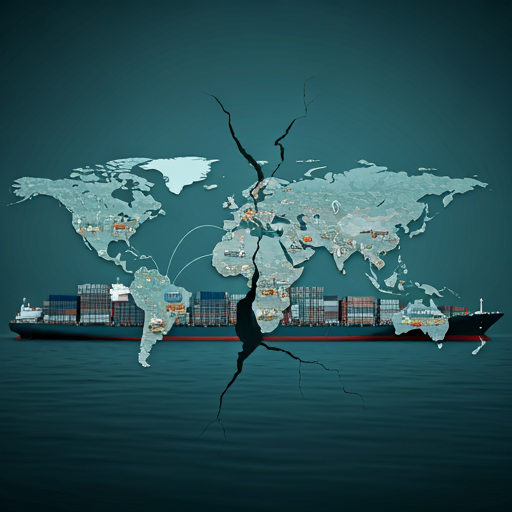Introduction to Global Supply Chain Disruptions
Overview of Supply Chain Dynamics
Global supply chain disruptions have become increasingly prevalent due to various factors, including geopolitical tensions and natural disasters. Thsse disruptions can lead to significant delays and increased costs for businesses. He must consider the ripple effects on stock-taking management and customer satisfaction . Supply chains are interconnected systems that rely on timely deliveries. A single delay can impact multiple stakeholders. Understanding these dynamics is crucial for effective risk management. Knowledge is power in navigating these challenges.
Recent Events Impacting Supply Chains
Recent geopolitical tensions have severely disrupted global supply chains. These events have led to increased volatility in commodity prices. He must analyze the implications for cost structures. Disruptions can create significant liquidity challenges for businesses. Casu flow management becomes critical during such times. Understanding these factors is essential for strategic planning. Knowledge is key to navigating uncertainty.
The Role of Cryptocurrency in Supply Chains
Blockchain Technology and Transparency
Blockchain technology enhances transparency in supply chains. It allows for real-time tracking of products. This capability reduces fraud and errors significantly. He can trust the data provided. Key benefits include:
These features foster accountability among stakeholders. Transparency builds consumer confidence. Trust is essential in business relationships.
Cryptocurrency as a Payment Solution
Cryptocurrency serves as an efficient payment solution in render chains. It facilitates faster transactions across borders. This reduces reliance on traditional banking systems. He can benefit from lower transaction fees. Key advantages include:
These features streamline operations significantly. Efficiency is crucial for competitiveness. Businesses can adapt quickly.
Impacts on Businesses
Operational Challenges and Adaptations
Operational challenges significantly impact businesses in various sectors. These challenges often lead to increased operational costs. He must evaluate the implications for profitability. Supply chain disruptions can hinder product availability. This affects customer satisfaction and loyalty. Key adaptations include:
These strategies can mitigate risks effectively. Proactive measures are essential for resilience. Adaptation is crucial for long-term success.
Financial Implications and Cost Management
Financial implications of supply chain disruptions can be significant. Increased costs often arise from delays and inefficiencies. He must assess the impact on cash flow. Effective cost management strategies are essential. Key strategies include:
These measures can enhance financial stability. Awareness is crucial for informed decisions. Knowledge leads to better outcomes.
Case Studies of Affected Industries
Manufacturing Sector Disruptions
Manufacturing sector disruptions have affected various industries significantly. For instance, the automotive industry faced production halts due to semiconductor shortages. He must recognize the impact on supply chains. Additionally, the pharmaceutical sector experienced delays in raw material sourcing. This can hinder product availability. Key examples include:
These disruptions highlight vulnerabilities in supply chains. Awareness is vital for strategic planning. Knowledge empowers better decision-making.
Retail and E-commerce Challenges
Retail and e-commerce have faced significant challenges recently. Supply chain disruptions have led to inventory shortages. He must knderstand the financial implications of these issues. For example, clothing retailers struggled with delayed shipments. This resulted in lost sales opportunities. Key challenges include:
These factors complicate financial forecasting. Awareness of these dynamics is essential. Knowledge can drive better strategic decisions.
Future Trends in Supply Chain Management
Increased Adoption of Digital Solutions
The increased adoption of digital solutions is transforming supply chain management. Companies are leveraging advanced technologies for efficiency. He must recognize the importance of data analytics. These tools enable better demand forecasting and inventory control. Key trends include:
These innovations enhance operational agility. Adaptation is crucial for competitive advantage. Knowledge of these trends is essential for success.
Resilience and Risk Management Strategies
Resilience and risk management strategies are essential for modern supply chains. Companies must develop robust frameworks to mitigate disruptions. He should focus on diversifying suppliers and enhancing inventory flexibility. These approaches reduce dependency on single sources. Key strategies include:
These measures improve responsiveness to market changes. Awareness of risks is crucial for sustainability. Knowledge empowers better decision-making processes.
Cryptocurrency’s Potential to Mitigate Disruptions
Smart Contracts and Automation
Smart contracts and automation can significantly enhance supply chain efficiency. They facilitate trustless transactions between parties. He must recognize their potential to reduce delays. By automating processes, companies can minimize human error. Key benefits include:
These features improve overall operational transparency. Efficiency is vital for competitive advantage. Knowledge of these tools is essential for innovation.
Decentralized Finance (DeFi) Solutions
Decentralized finance (DeFi) solutions offer innovative ways to manage financial transactions. They eliminate intermediaries, reducing costs and increasing efficiency. He should consider their role in enhancing liquidity. By utilizing smart contracts, businesses can automate complex processes. Key advantages include:
These features can mitigate disruptions effectively. Awareness of DeFi is crucial for adaptation. Knowledge empowers strategic financial decisions.
Conclusion and Recommendations
Strategic Planning for Businesses
Strategic planning is essential for navigating market uncertainties. Businesses must assess risks and opportunities continuously. He should prioritize flexibility in operations. This adaptability enhances resilience against disruptions. Key recommendations include:
These strategies can improve decision-making processes. Awareness is vital for long-term success. Knowledge leads to informed business strategies.
Embracing Innovation in Supply Chains
Embracing innovation is crucial for modern supply chains. Companies must adopt new technologies to enhance efficiency. He should focus on integrating automation and data analytics. These tools can streamline operations significantly. Key recommendations include:
These strategies foster adaptability in changing markets. Awareness of trends is essential for growth. Knowledge drives competitive advantage in supply chains.
